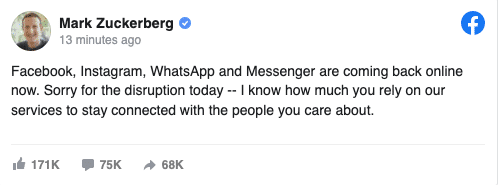
For around six hours on Monday, October 4th, 2021, social media titan Facebook and its family of applications WhatsApp and Instagram were offline to billions of users, in what was one of the longest disruptions for Facebook at a group level. While globally there were rumours of cyber-hacks on Facebook’s servers, the company has stated that the outage was just caused by an internal configuration error.
So, what went wrong?
Facebook’s applications, including WhatsApp, Instagram, and Oculus VR, went down just after 9 p.m. IST on Monday and did not return until early Tuesday morning. The disruption affected users globally, including Facebook professionals unable to access internal services.
Has Facebook figured out what’s causing the issue?
Changes to backbone routers caused communication disruptions across Facebook’s data centers, as per a blog post. The disturbance in network traffic caused our data centers to halt communication, Facebook explained. In simple language, Facebook’s machines were unable to communicate with one another due to a DNS (domain name system) issue.

Is it possible that this was a cyberattack?
According to Facebook’s blog, “We want to be clear that the main cause of this disruption is currently believed to be an erroneous configuration modification. We also have no evidence that any user information was compromised as a result of the outage.” According to the New York Times, which cited two unidentified Facebook security team employees, the downtime was not likely a symptom of a cyberattack because the technology underlying it was not compromised. The applications were still varied enough that a single hack would not likely affect all of them at the same time.
Consequences of these outages
In recent years, there has been a rise in internet outages. ThousandEyes, a network-monitoring service operated by Cisco Systems Inc., reported 367 global internet disruptions in the week ending September 26, marking the third consecutive week of growing outages. Even though the Internet was designed to be a decentralized network, analysts claim that a small number of infrastructure businesses, such as Akamai, Fastly, and Amazon Web Services, have become concentrated centers offering services to key Internet platforms. This is especially true after the epidemic, when hundreds of businesses, both large and small, have increased their digital efforts.
In conclusion, the outage affecting Facebook, WhatsApp, and Instagram highlights the vulnerability of centralized social media infrastructure, revealing ongoing challenges in maintaining reliable online services amidst growing digital reliance.